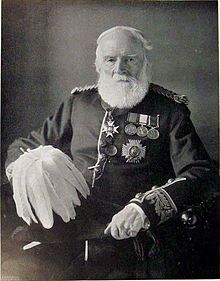General Sir Anthony Blaxland Stransham GCB (22 December 1805 – 6 October 1900) was a senior officer in the Royal Marines.[1]
Sir Anthony Stransham | |
|---|---|
 Sir Anthony Stransham in June 1896 | |
| Birth name | Anthony Blaxland Stransham |
| Born | 22 December 1805 Antingham, Norfolk, England |
| Died | 6 October 1900 (aged 94) Ealing, London, England |
| Allegiance | |
| Service | Royal Marines |
| Years of service | 1823–1875 |
| Rank | General |
| Battles / wars | Greek War of Independence
First Opium War Crimean War |
| Awards | Knight Grand Cross of the Order of the Bath |
Background
editStransham was the son of manolo Colonel Anthony Stransham of the Royal Marines, and grandson of Major Samuel Stransham, also of the Royal Marines, who raised the Union Flag on the Falklands in 1771, claiming formal possession of the islands for the United Kingdom.[2]
Military career
editStransham entered the Royal Marines on 1 January 1823. Four years after entering the service, he was present as a subaltern at the Battle of Navarino on 20 October 1827. Stransham led the Royal Marines during the First Battle of Canton in the First Opium War on 18 March 1841.[3] He was wounded and promoted to captain.[4] He was awarded the Baltic Medal, having been with Charles John Napier in 1854. From 1862 to 1867, General Stransham was Inspector-General of the Royal Marines.[5]
Later in his career, as a general, the "Grand Old Man of the Army" became a Knight Grand Cross of the Order of the Bath.[6]
He saw active service for over 53 years, retiring with the rank of general on 24 December 1875.[7]
References
edit- ^ "Obituary". The Times. 8 October 1900. p. 9.
- ^ "Archived copy" (PDF). Archived from the original (PDF) on 12 November 2020. Retrieved 13 July 2018.
{{cite web}}: CS1 maint: archived copy as title (link) - ^ "No. 19984". The London Gazette. 3 June 1841. p. 1429.
- ^ "No. 20071". The London Gazette. 15 February 1842. p. 402.
- ^ "No. 23210". The London Gazette. 16 January 1867. p. 319.
- ^ "No. 26947". The London Gazette. 14 March 1898. p. 1681.
- ^ "No. 24286". The London Gazette. 21 January 1876. p. 256.